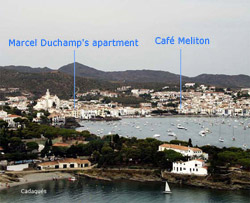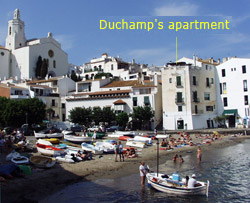READYMADE/UNMADE,
Laurent Sauerwein 2007
He was a face from my childhood before I realized he was an art history icon.
My father had bought a small house in the Catalan village of Cadaqués, on the Mediterranean coast of Spain. We would go there in the summer, and I would often see an elderly gentleman slowly walking through the village. My father would say hello and exchange a few pleasantries. I would shake the smiling gentleman’s hand, and we would all continue our summer business. Then I would hear about various dinners to which my father and his wife were invited along with the elderly Marcel – that was his name – and his wife Teeny. And at those dinners, there were another dozen people, the usual international lot, some permanently settled in Cadaqués, others just passing through.
Marcel was the discreet center of a small world of familiar faces you would run into, toward the cooler part of the afternoon, after having spent the day out in the boat, along the rocky shores of the Costa Brava.
I’d been told that Marcel Duchamp was an artist, but there was nothing extraordinary about that, as a lot of artists of all kinds lived or spent the summer in Cadaqués, some famous, others obscure, some remarkable, some very bad. Most of the art that was shown in the local galleries was mediocre, except for the Galeria Cadaqués, run by the architect Franco Bombelli. The gallery was a vaulted white-washed space where contemporary art was shown and where, on opening nights, you just might catch a glimpse of Marcel.
Every summer day
click to enlarge

Figure 1
Marcel Duchamp’s daily
trip to play chess at Café Meliton
There was another place where you were absolutely sure to see Duchamp: at exactly 5:00 p.m. and at precisely the same spot, in the same chair, at the same table, every summer day.
The place was the café Meliton, at the northern end of the Paseo, the village’s main meeting place. The tiny café has a handful of tables inside and, across the road, a few more, practically on the beach. You would never catch Marcel sitting outside, however, at least I never did. At 5:00 p.m. sharp, every day, he would go inside, just to the right, and sit down on the wicker chair, his back to the wall, covered, salon-style, with framed pictures, autographed photographs, small oil canvases and watercolor landscapes, faded surrealist sketches and other souvenirs. Marcel would sit there, watching the waiter and waitress go about their business, going to the counter at the rear to fill their round trays with drinks ordered by people sitting outside. Somewhere in the back, a very striking gentleman was discreetly supervising the operation. His last name was Meliton, which had a proud ring to it. He had a very distinguished tanned face, the hands of a fisherman and elegant, totally white hair. He was younger than Marcel but had been around. He had been an anti-Franco, Republican hero in the Spanish Civil War. The waiter was his son, the waitress his daughter. Marcel wanted to be at that particular table, so Meliton kept it for him. It went without saying. With Marcel, everything went smoothly.
Then Marcel would order a drink and gracefully proceed to light a cigar. It was a ritual of sorts, with inframince differences from day to day.
click to enlarge

Figure 2
Marcel and Teeny
Duchamp’s apartment on
the top floor of a house on
Port d’Alguer, in Cadaqués
In the summer of 1965, I took advantage of Duchamp’s daily habit. By then, I had just turned 21 and was living in Cambridge, Mass., discovering contemporary art among other things. And so, in my youthful mind, he was no longer Marcel, the elderly friend of my parents, but Marcel Duchamp, discreetly carrying about him the aura of a century of art. So one day, I went to Meliton’s a bit ahead of time, and sat at the table next to the one which I knew he would soon occupy. When he appeared, I greeted him, and he kindly invited me to pull up a chair. I was full of questions, all of which he answered with patience and courtesy. I didn’t ask him about his work really, probably because I felt comfortable with its enigmatic nature. But what I longed to hear about in my youthful enthusiasm, were details about people I’d been reading about so recently: Picabia, Tzara, Eluard, Max Ernst, Breton, Varèse, Masson… They were all in the Pantheon, names I had only encountered in books or museums, and Marcel had known them all. Marcel who was a familiar face, a warm and witty presence, a part of my childhood before he became, for me, a figure, no longer Marcel but Marcel Duchamp. Of course, in Cadaqués, you’d see Dali’s name everywhere, on postcards, mugs and tacky souvenirs. And you would occasionally run into him, with his funny moustache and walking cane, followed by the ever-present, ghostly Gala, his wife. They were unavoidable, but they were not in my Pantheon, whereas Marcel had become something of a spiritual father, someone paradoxically brought closer by his mystery, and the fact that everyone thought (wrongly, as it turned out) that he had ceased all artistic activity.
Meanwhile, back at the Café Meliton, at 5:30 sharp, a fellow walked in and sat across from Marcel. It was often a tall Swede. A wooden chess board was immediately brought to them. Glasses and cups were removed. At that point, I knew I had to shut up. The serious business was about to begin. I didn’t know much about chess at the time, so I don’t remember what openings Duchamp favored, or anything about his style of play. All I can say is, however dramatic the confrontation might have been, Marcel kept focused, samurai-like, periodically puffing on his cigar. I don’t remember whether he usually won, but it felt like he did, regardless of the outcome. My feeling was that he was less an aggressive player than one who knew how to exploit his opponent’s moves. I didn’t stay until the very end actually, because I thought that would have been indiscreet. What was at stake on the chess board seemed too intimate to watch.



